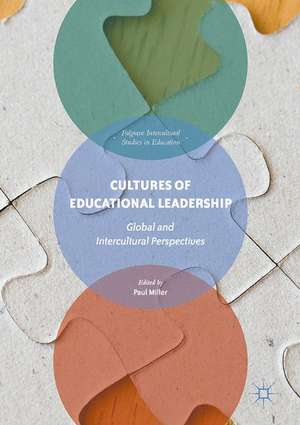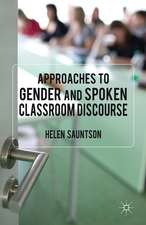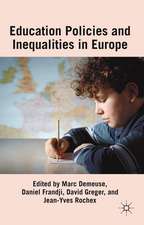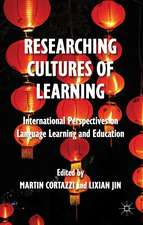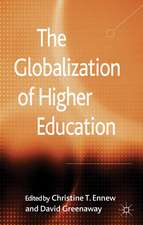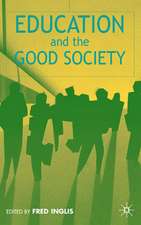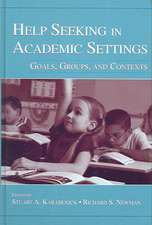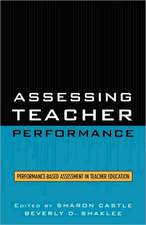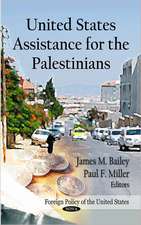Cultures of Educational Leadership: Global and Intercultural Perspectives: Intercultural Studies in Education
Editat de Paul Milleren Limba Engleză Hardback – 23 dec 2016
Preț: 698.15 lei
Preț vechi: 821.35 lei
-15% Nou
Puncte Express: 1047
Preț estimativ în valută:
133.61€ • 138.97$ • 110.30£
133.61€ • 138.97$ • 110.30£
Carte tipărită la comandă
Livrare economică 15-29 aprilie
Preluare comenzi: 021 569.72.76
Specificații
ISBN-13: 9781137585660
ISBN-10: 1137585668
Pagini: 240
Ilustrații: VIII, 272 p. 4 illus.
Dimensiuni: 148 x 210 x 20 mm
Greutate: 0.45 kg
Ediția:1st ed. 2017
Editura: Palgrave Macmillan UK
Colecția Palgrave Macmillan
Seria Intercultural Studies in Education
Locul publicării:London, United Kingdom
ISBN-10: 1137585668
Pagini: 240
Ilustrații: VIII, 272 p. 4 illus.
Dimensiuni: 148 x 210 x 20 mm
Greutate: 0.45 kg
Ediția:1st ed. 2017
Editura: Palgrave Macmillan UK
Colecția Palgrave Macmillan
Seria Intercultural Studies in Education
Locul publicării:London, United Kingdom
Cuprins
Chapter 1. Cultures of Educational Leadership: Researching and Theorising Common Issues in Different World Contexts; Paul Miller.- Chapter 2. A Social Justice Perspective on Women in Educational Leadership; Deirdre Torrance, Kay Fuller, Rachel McNae, Carmel Roofe & Rowena Arshad.- Chapter 3. Educational Leadership among Women of Colour in United States, Canada, New Zealand; Elizabeth Murakami, Gaetane Jean-Marie, Lorri Santamaria & Ann E. Lopez.- Chapter 4. A Comparative Analysis of Intersections of Gender and Race among Black Female School Leaders in South Africa, United Kingdom and the United States; Pontso Moorosi, Kay Fuller & Elizabeth Reilly.- Chapter 5. The Challenge of Leadership: Ethnicity and Gender among School Leaders in London, Malaysia and Pakistan; Victoria Showunmi & Maria Kaparou.- Chapter 6. Gender and Leadership in Brazilian, Singaporean and Spanish Secondary Schools: An In-Depth Analysis Based on the 2013 TALIS; Marina García-Carmona, Miren Fernández-de-Álava & Carla Quesada-Pallarès.- Chapter 7. Policy Leadership, School Improvement and Staff Development in England, Tanzania and South Africa: Schools Working Together; David Middlewood, Ian Abbott, Vhonani Netshandama & Philip Whitehead.- Chapter 8. Leadership for the Attainment of Improved School Outcomes: A Brazilian, Australian and Maltese Study; Lindy-Anne Abawi, Ana Maria de Albuqerque Morereira & Christopher Bezzina.- Chapter 9. Sustaining Growth of Novice Teachers to Leadership through Mentorship Process: A Study of Praxis in Brazil, Canada, Pakistan, and South Africa; Elizabeth Majocha, Marco Antonio Costa, Mamotena Mpeta, Nargis Ara, Catherine Whalen & Terezinha Alves Fernandes.- Chapter 10. Cross-Cultural Stories of Practice from School Leaders; Joan Conway, Dorothy Andrews, Leentjie van Jaarsveld & Cheryl Bauman.- Chapter 11. Whole School Development across Borders: Leading Intercultural and Cross-Cultural Learning; Paul Miller & Ian Potter.
Notă biografică
Paul Miller is President of the Institute for Educational administration & Leadership- Jamaica where is he is also the Director of Strategy & Partnerships and convenor of the Research Interest Group on “Leadership & Social Justice”. He is also Professor of Educational Leadership & Management in the School of Education & Professional Development at the University of Huddersfield, UK.
Deirdre Torrance, University of Edinburgh, UK
Kay Fuller, University of Nottingham, UK
Rachel McNae, University of Waikato, New Zealand
Carmel Roofe, University of the West Indies, Jamaica
Rowena Arshad, University of Edinburgh, UK
Elizabeth Murakami, Texas A&M University-San Antonio, USA
Gaetane Jean-Marie, University of Louisville, USA
Lorri Santamaria, University of Auckland, New Zealand
Ann E. Lopez, Ontario Institute for Studies in Education, University of Toronto, Canada
Pontso Moorosi, University of Warwick, UK
Kay Fuller, University of Nottingham, UK
Elizabeth Reilly, Layola Marymount University, USA
Victoria Showunmi, UCL Institute of Education, UK
Maria Kaparou, University of Southampton, UK
Marina García-Carmona, Universidad de Granada, Spain
Miren Fernández-de-Álava, Universidad Autónoma de Barcelona, Spain
Carla Quesada-Pallarès, University of Leeds, UK
David Middlewood, University of Warwick, UK
Ian Abbott, University of Warwick, UK
Vhonani Netshandama, University of Venda, South Africa
Philip Whitehead, University of Warwick, UK
Lindy-Anne Abawi, University of Southern Queensland, Australia
Ana Maria de Albuqerque Morereira, University of Brasilia, Brazil
Christopher Bezzina, University of Malta
Elizabeth Majocha, Gabriel Dumont Institute, Canada
Marco Antonio Costa, Universidade Federal de Campina Grande, Brazil
Mamotena Mpeta, University of Venda, South Africa
Nargis Ara, Government Girls Post Graduate College, Pakistan
Catherine Whalen, University of Northern British Columbia, Canada
Terezinha Alves Fernandes, Federal University of Paraíba, Brazil
Joan Conway, University of Southern Queensland, Australia
Dorothy Andrews, University of Southern Queensland, Australia
Leentjie van Jaarsveld, North West University, North West University
Cheryl Bauman, Independent Consultant, Ontario, Canada
Caracteristici
Gives true meaning to cross-cultural and intercultural research and theory building in educational leadership Builds on research which spans at least three countries per chapter to develop intercultural possibilities Represents a range of developing and developed countries for more authentic cross cultural comparison
